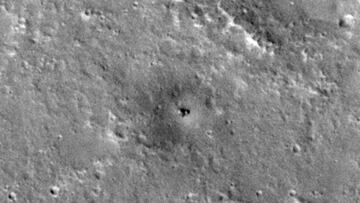NASA spacecraft found ‘dead’ robot on Mars surface: what is it and to which mission does it belong?
The Mars Reconnaissance Orbiter, which has been studying the surface of the Red Planet since 2006, caught a glimpse of another NASA mission on the ground.

The Mars Reconnaissance Orbiter has been looking down at the surface of the Red Planet for almost 20 years. It is looking for the existence of water as well as providing support for other NASA missions as a key data relay station.
Earlier this month it caught sight of another robot the US space agency sent to the surface of Mars in 2018 but has ceased to function. Despite being ‘dead’, it is still proving useful for studying Mars as NASA explained.
NASA spacecraft found ‘dead’ robot on Mars surface: what is it and to which mission does it belong?
The lander in question was NASA’s InSight which was sent to the Red Planet to study the interior of Mars. “[It] was designed to take the planet’s vital signs: its pulse, temperature, and reflexes,” explains the US space agency. Its landing site is near Mars’ equator on a flat, smooth plain called Elysium Planitia.
Can you spot @NASAInSight?
— NASA Mars (@NASAMars) May 6, 2024
The retired lander was recently spotted by the Mars Reconnaissance Orbiter. By studying InSight's landing site over time, scientists can see how quickly dust accumulates, which helps estimate the age of other surface disturbances. pic.twitter.com/ZsazACkZSs
The craft deposited a seismometer on the surface to study marsquakes recoding over 1,300 including one that was a magnitude 4.7 in May 2022. InSight also drove a thermometer deep into the Red Planet to measure Mars’ temperature. Additionally, it provided a daily weather report from the planet human’s hope to one day visit in person.
Related stories
It operated for four years until it ran out of power in 2022. Unlike the Curiosity and Perseverance rovers, which are nuclear-powered and still operating on Mars, InSight was powered by solar panels. The build up of dust on them eventually degraded their effectiveness at recharging the craft’s batteries.
However, it is still useful sitting around on the surface literally collecting dust. “By studying InSight’s landing site over time, scientists can see how quickly dust accumulates, which helps estimate the age of other surface disturbances,” NASA Mars explained in a post on X, formerly known as Twitter. They also shared a picture of InSight that the Mars Reconnaissance Orbiter was able to capture from outer space.



Complete your personal details to comment